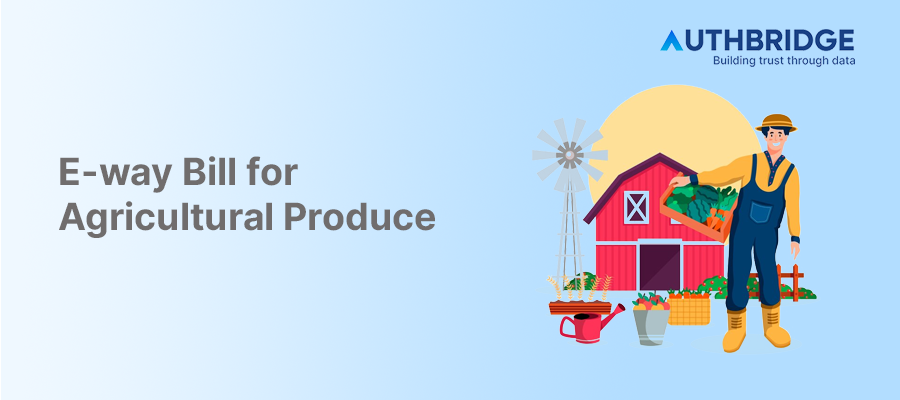Navigating E-way Bill Compliance For Agricultural Produce: A Comprehensive Guide

The Goods and Services Tax (GST) has revolutionized the taxation system in India, streamlining the process by consolidating multiple indirect taxes into a single tax. This change has significantly impacted all sectors, including agriculture. One of the critical aspects under GST that affects the agricultural sector is the E-way Bill system, designed to facilitate the smooth transport of goods across India. Let's delve deeper into how GST and the E-way Bill system apply to agricultural produce.
Definition of Agricultural Produce under GST
Agricultural produce encompasses any product derived from the cultivation of plants and the rearing of animals, excluding horses, for food, fiber, fuel, raw materials, or other similar products. According to Section 2(1) (a) of the CGST Act, 2017, agricultural produce is defined as produce on which no processing is done, or such processing is done as is usually done by a cultivator or producer which does not alter its essential characteristics but makes it marketable for the primary market.
Overview of E-way Bill in the Context of Agricultural Produce
The E-way Bill is an electronic documentation system for tracking the movement of goods, mandatory for inter-state and intra-state transportation under certain conditions. It's crucial for stakeholders in the agricultural sector to understand when and how the E-way Bill applies to the transport of agricultural produce, ensuring compliance and avoiding penalties.
Taxability of Freight on Agricultural Produce under GST
The taxability of freight, or the cost incurred in transporting goods from one place to another, plays a significant role in the agricultural sector under GST.
Inter-state Supply of Agricultural Produce
For inter-state supplies, the freight charges are taxable under GST. The place of supply is considered the location of the recipient, and the tax is charged at the rate of IGST (Integrated Goods and Services Tax). For instance, if a farmer in Maharashtra incurs freight charges of Rs. 10,000 to transport produce to Uttar Pradesh, IGST will be calculated on the total value, including the freight charges.
Intra-state Supply of Agricultural Produce
In the case of intra-state supplies, the taxability of freight charges depends on whether the transaction is a composite or a mixed supply. If it's a composite supply, the freight charges are included in the value of the goods and taxed accordingly. If it's a mixed supply, the taxability of freight charges depends on the tax rate applicable to the principal supply.
Understanding the E-way Bill Requirements for Agricultural Produce
When is an E-way Bill Required for Agricultural Produce?
An E-way Bill is required for the transportation of goods exceeding a value of Rs. 50,000. However, there are exemptions and special considerations for agricultural produce, recognizing the sector's unique needs and challenges.
Exemptions and Special Considerations for Agricultural Produce
Certain types of agricultural produce are exempt from the E-way Bill requirement, aimed at easing the burden on small farmers and traders. It's essential to stay updated with the latest notifications and guidelines from the GST council regarding these exemptions.
Generating and Managing E-way Bills for Agricultural Transport
Step-by-Step Guide to Generating an E-way Bill
- Registration: The transporter or consignor must register on the E-way Bill portal.
- Filling Details: Enter the details of the consignment, including the nature of goods, value, and transporter details.
- Generation: Upon submission, the portal generates an E-way Bill with a unique E-way Bill Number (EBN).
Managing E-way Bills: Amendments, Cancellations, and Validity
E-way Bills can be amended or cancelled if there are changes in the consignment or transport details. The validity of an E-way Bill depends on the distance the goods have to be transported, typically 1 day for every 100 km.
Compliance and Penalties
Compliance Requirements for Transporters and Farmers
Transporters and farmers must ensure that an E-way Bill accompanies the consignment if the value exceeds the threshold. Failure to comply can lead to penalties and seizure of goods.
Penalties for Non-compliance with E-way Bill Regulations
Non-compliance can result in a penalty equal to the tax evaded or Rs. 10,000, whichever is higher. It's crucial to adhere to the regulations to avoid such penalties.
Tips for Smooth Compliance and Transportation
- Regularly update the knowledge base regarding GST and E-way Bill regulations.
- Use technology to streamline the generation and management of E-way Bills.
- Engage with professional services for complex compliance requirements.
Conclusion and Future Outlook
The introduction of the E-way Bill under GST has brought significant changes to the transportation of agricultural produce. While it aims to streamline the process and ensure transparency, it also presents challenges, especially for small-scale farmers and traders. The future may see further refinements to the system, making it more accessible and less burdensome for the agricultural sector. Keeping abreast of changes and adopting best practices will be key to navigating the complexities of GST and E-way Bills in agriculture.
Category

Abhinandan Banerjee
(Associate Manager - Marketing)
Abhinandan is a dynamic Product and Content Marketer, boasting over seven years of experience in crafting impactful marketing strategies across diverse environments. Known for his strategic insights, he propels digital growth and boosts brand visibility by transforming complex ideas into compelling content that inspires action.



